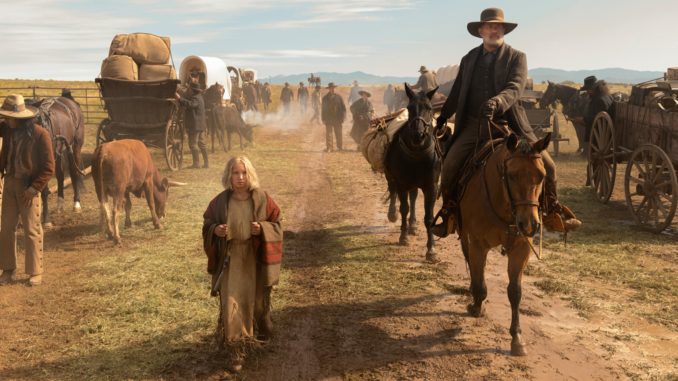
In News of the World, the new Tom Hanks picture, there’s plenty of ferocious action and a good deal of impressive speechifying, but much of what’s best in it occurs in quiet moments in which the actors are silent and what we can read in their faces seems more eloquent than anything that gets said out loud.
This isn’t to say that it’s badly written—quite the contrary, it’s a smoothly effective adaptation of the esteemed novel by Paulette Jiles. But Paul Greengrass’ film version is a somewhat uneven mix of thematic seriousness and cinematic tropes. As a post-Civil War western set in the Texas of 1870, the film is chock full of historical and social issues, with much that resonates for our own times. Part of it plays like a big-budget western from the 1950s and part of it is a rough textured “revisionist” western of more recent vintage.
Perhaps that contrast is meant to serve as a way of highlighting the evolution of the central characters and their relationship. And it works well enough, as such. But the onscreen results seem a bit unbalanced. As a large-scale social/historical drama, it tilts toward a bland but pleasing kind of well-intentioned seriousness. In its rougher and more intimate moments, this movie hints tentatively at thoughts and emotions that are harsher and more complex than its abiding (PG-13?) feel-good tendencies can handle.
The story is a rousingly episodic adventure, and its central personages are a widowed ex-Confederate officer (Hanks) and a twice-orphaned child named Johanna Leonberger (Helena Zengel) who has spent most of her young life in captivity among Kiowas. Hanks’ Captain Jefferson Kyle Kidd travels from town to town giving public readings of stories from contemporary newspapers, and he first encounters Johanna in the wilderness near the place where the black man charged with retrieving her from the Kiowas has just been lynched by racist Texans.
Kidd, somewhat reluctantly, takes charge of Johanna, and she in turn is strongly and understandably suspicious of any attempt to “rescue” her from the only society she’s ever really known. Nevertheless, and not too surprisingly, a bond begins to form between them as they face multiple adversities on their respective journeys to some kind of home and family life.
Those adversities include fearsome encounters with a redneck tyrant who means to impose complete white supremacy on the Texas town he rules over, and a trio of renegade Confederate vets who mean to take possession of Johanna as a sex slave. Furious gunfights ensue in both cases. And it complicates things in another way when neither the U.S. Cavalry nor Johanna’s blood relatives know what to do with her once Kidd has tried to deliver her to them.
Zengel is fiercely convincing in the role of Johanna. Hanks of course manages the gravity of Kidd with characteristic ease, but very rarely does much with what would seem to be the rough edges of Kidd’s grizzled vet. Elizabeth Marvel has a good moment or two as the widow Gannett, the first of Kidd’s acquaintances to make genuinely sympathetic contact with Johanna.
Maybe the best acting in the film comes from Michael Angelo Covino. He plays LaMay, the leader of those shabby renegades. LaMay is obviously a figure of evil in allegorical terms, but Covino plays him with a kind of desperate hilarity. To my lights, his Almay succeeds both as a symbol and as a character portrait with touches of complex mystery.

Be the first to comment